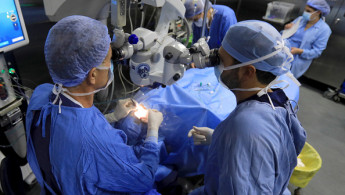Lebanese health workers praised for saving hundreds after pager blasts
Lebanon’s healthcare sector is being praised by the country’s officials for its rapid response to the aftermath of pager and walkie-talkie device explosions across the country, which killed 37 people and injured nearly 3,000 others.
The attacks targeted communication devices used by Lebanese group Hezbollah and have widely been blamed on Israel.
With the attacks mostly taking place in southern Beirut and the provinces of Bekaa and Baalbek-Hermel, officials told The New Arab's sister site Al-Araby Jadeed that a nationwide emergency plan, put in place following the onset of Hezbollah-Israel clashes since October 7, helped significantly in the handling of the recent attacks.
Dr. Joseph El-Helou, Director of the Medical Care Directorate at the Ministry of Public Health, commended the healthcare workers for their strenuous efforts, drawing parallels to their dedication during the Covid-19 pandemic and the aftermath of the 2020 Beirut Port explosion.
"Lebanon's healthcare sector is exemplary, with its rapid response widely acknowledged. Some doctors performed surgeries for hours without interruption," he told Al-Araby Al-Jadeed.
He noted that while most patients are now stable, some remain in critical condition.
El-Helou highlighted the success of the emergency plan, which involved close coordination between the Ministry of Health, public and private hospitals, medical and nursing syndicates, the Civil Defence, the Lebanese Red Cross, and the Islamic Health Authority.
Despite these efforts, he described the immense challenges faced, particularly the large number of eye injuries, which required more surgical microscopes than were available.
"The largest hospitals have only two to four such microscopes, forcing us to transfer patients to other facilities," he said.
El-Helou also criticised Western nations for "remaining spectators," while Lebanon received medical supplies from Iraq, Iran, and Jordan.
He noted that an Iraqi medical team had arrived to assist.
Health Minister Firas Al-Abiad, visiting injured patients in Bekaa and Baalbek-Hermel, also praised the healthcare sector for preventing a larger catastrophe.
"The disaster could have been much worse if not for the hospitals' capabilities, the emergency plan, and the dedication of the medical staff," he said, pledging continued support for long-term care.
The United Nations has since said that these attacks could constitute war crimes.
On Friday, UN High Commissioner for Human Rights Volker Turk, condemned the use of booby-trapped devices disguised as harmless objects, calling for an "independent, rigorous, and transparent" investigation during an emergency UN Security Council session.
Although Israel has not commented on the explosions, it has hinted at expanding its military operations from Gaza to include the Lebanon front, where it has clashed with Hezbollah for nearly a year.
The conflict has claimed hundreds of lives in Lebanon.





 Follow the Middle East's top stories in English at The New Arab on Google News
Follow the Middle East's top stories in English at The New Arab on Google News


